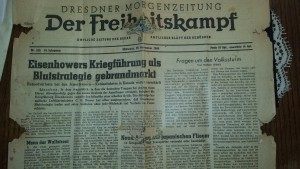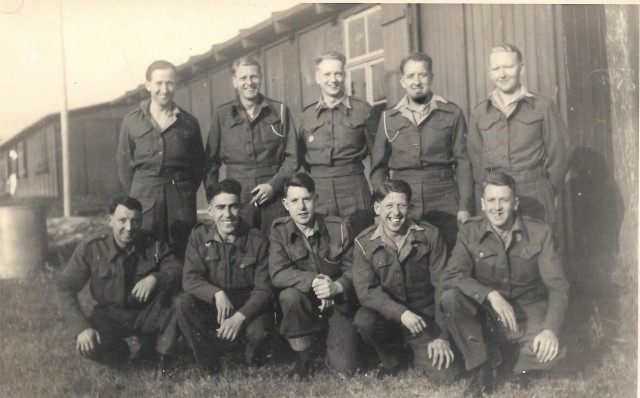“The one big point”, 96 year old Dennis Brock tells me, “that the BBC failed to mention in their coverage of the anniversary of the Dresden bombings was just how important the City was to the Russians.”
L/Bdr Brock was one of the many Prisoners of War who were in labour camps near the industrial hub on the Eastern side of Germany which had largely been overlooked by Allied bombing runs until 1945. The Red Army was at Breslau, Poland and the only working railway centre for the Germans fighting the Russian front was in Dresden.

Dennis Brock holds up a bell made from melted down German fighter planes shot down over England
The former Lance Bombardier was working in a brick works, in charge of 45 men when the raids took place. As well as that factory, there were other crucial elements of the German war machine nearby.
“Dresden was alive with factories, all manned by forced Labour from the East, including making artillery shells,” says Mr Brock.
“In their coverage, the BBC didn’t emphasise how the City was the centre for the German war effort, including optical works for the Luftwaffe and tanks, all staffed by PoWs from Britain and the Empire as well as French and Italians.”
The soldiers, captured by the Nazis during the earlier war years and when Italy switched sides from the Axis, were all herded towards the industrial heart beat as the Allies advanced from the South, East and through France, Belgium and the Netherlands.
“There were a few small daylight raids by a few US bombers” Mr Brock recalled, “overspill from another raid in Freital. But that was a warning that the Allied air forces had found us.”
The Germans were sure that Dresden, viewed as the jewel in the crown of Saxony, would never be subject to bombardment as other historic monuments including the Grand Place in Brussels was spared.
When the young soldier expressed his surprise that the Allies had not made a target of it was, a German Sgt/Maj in charge of the camp replied, “Dresden will never be bombed because the Luftwaffe will never bomb Oxford.”
L/Bdr Brock and his fellow PoWs were heaving coal on the night of the raid, having spent the daytime going out to pick up bits of machinery to try to fix equipment used in the brickworks. “We were general labourers,” he said.
“On that day, six or seven of us went down near the marshalling yard at 2200hrs and the air raid sirens went off as usual – they passed over Dresden quite frequently on the way to other targets.” He said he looked up to see mosquitos dropping chandelier flares and said he told the men with him, “this is the night, we’re going to cop it.”

A copy of a Dresden newspaper in 1944
Just after 2230hrs, 800 four engined bombers appeared overhead, not dropping high explosives but incendiaries which created the fire storms.
“When we heard the force coming towards us we told our guards “we’ve got to get back to our camp” but the Germans were having none of it. “Luckily we managed to talk them around but they didn’t know their way around Dresden like we did, so we showed them where to go.”
They made their way up the railway lines towards an old music hall which had been given to the Prisoners as a first aid station. “We had firebombs on our tail all the way back to the brickworks” Mr Brock said.
The men had made a shelter in case of an air raid but refused to use it during the fierce bombing. “We thought we were making it for the Germans so we didn’t make it very well,” he said, a glimmer of a young soldier’s laughter in his eyes. “A couple of bricklayers from Birmingham were in our group and they had missed out some key elements of the structure so it wasn’t really safe.”
The men were right to avoid it: it fell down, but not during the raid. “It fell down on its own!” Mr Brock said.
The fire raid lasted 45 minutes and by 2315 hours the bombers had gone back to England. It was the furthest raid they had been on: a five and a half hour trip there, an hour overhead and a five and a half hour return back to Lincolnshire where most of the RAF bases were (and still) are.
The next day, American Flying Fortresses flew over and dropped high explosives.
“We burned it down, they took the heart out of it” Mr Brock explained. “Until then, they had been completely unmolested and they had very few anti-aircraft guns with many of them rushed towards the Russian front to be used as ground artillery. And all of a sudden, above the city, there were swarms of long distance fighters.”
When I ask him how he felt at the time of the bombing, after three years of Labour camps, being marched over Europe and working 0630 – 1730 shifts in brick yards or locked up for four months in a barbed wire cage in Benghazi with nothing but the blood stained clothes he was captured in he tells me “We gave three hearty cheers.”
“But the media have since told us we were wrong to do this.”
When asked if he thinks this is right, that the media should tell first hand witnesses of the second world war how they should feel about the bombings, he simply says, “We were there, they weren’t.”
Many of the men were sent into the town when it was cool enough for them to get near – not, as Mr Brock said he heard one veteran telling a media outlet, the very next day. “It was too hot go to there the next morning – the cobbles were so hot they burnt the leather off people’s shoes.”
Did he feel guilty that it was the British who caused the death of so many, as he explains how they were “finding no end of bodies” as they cleared away the rubble?
“No, because the Nazis did it to our cities.”
And Mr Brock says he is certain the bombing, however horrific, brought about a more speedy end to the Second World War.
“It stopped supplies getting to the Russian front and helped the Russians advance” he explained, simply.
A BBC spokesman responded to the criticism of the coverage, saying: “The bombing of Dresden has always been a controversial episode. On Thursday evening the main BBC News bulletins reflected this and featured interviews with British veterans in coverage of preparations for the commemoration. On Friday we covered the commemoration ceremony in Dresden, which understandably reflected on the German experience.”
Former Defence Minister Sir Gerald Howard, told the Daily Mail, “It is very unfortunate that the BBC chose on all days to produce such a one-sided account.
“It was just as one might expect from the BBC, concentrating on the negatives.
“What about the civilians in London who were bombed out of their homes? What about the bombing in the Blitz? To suggest that those responsible for the bombing of Dresden were on a par with Hitler or guilty of war crimes is an absolute disgrace.”
Main photo shows L/Bdr Dennis Brock and fellow British PoWs in the camp in Gorbitz, a suburb of Dresden.

COMMENTS
Please let us know if you're having issues with commenting.